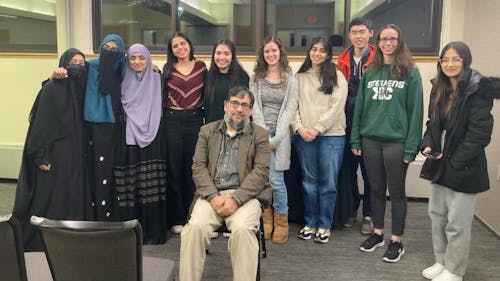Targum spotlight: Refugee Health Connection benefits local refugees with outreach efforts

Refugee Health Connection is an on-campus organization that intends to help vulnerable communities, particularly refugees, through service projects and educational presentations.
Anna Katz, a School of Arts and Sciences junior and co-president of Refugee Health Connection, said she has been a part of the organization since its creation in November 2022.
The organization has two broad components: a nonprofit aspect, centered around community outreach, and a club component, which focuses on conducting meetings and hosting events at the University, said Katz.
The club also has a nonprofit committee tasked with locating community service opportunities and an executive board committee to manage event planning.
"We're developing a lot, and we love new ideas," Katz said. "It's definitely a great way to be a part of something that's constantly evolving, especially since we're so new."
Katz noted that events are often planned with a language barrier in mind, as many attendees do not speak English as their first language. As a result, some of the club's events have been oriented toward visual activities, like game nights featuring Pictionary, charades and Jeopardy to help members socialize.
Members have also created care packages with hand-sewn stuffed animals and dental hygiene items to be donated to Interfaith-RISE in Highland Park, Katz said. While the Interfaith-RISE location handled the distribution of the care packages, she said members have had the opportunity to connect with refugees in person through presentations.
"I think that that's a really unique opportunity, to be able to have such a close contact relationship with refugee organizations and refugees," said Katz. "I feel like our members really feel like they're making a difference."
These presentations, which can last for an hour, cover topics from body, nutrition and hygiene to insurance and first aid. They also incorporate hands-on elements, such as how to bandage an injury using a first aid kit.
With respect to the complex subject matters discussed, as well as potential language barriers, there is a translator readily available. Club members also include pictures in their presentations, which makes the material easier to comprehend for those who may not speak English as their first language, Katz said.
Despite these obstacles, she said the refugees often express their gratitude at the end of the presentations.
"If we help someone even understand a little bit, then I think that's a win," she said.
Katz said given the nature of the content discussed in the organization, the club mainly consists of students who are interested in pursuing careers in the medical field.
Regardless of one's background, she said anyone can benefit from joining the club, especially those in people-oriented professions.
"Especially if (current Rutgers students) want to be physicians, or teachers or any psychologist, anyone that works with people directly, I think being aware of the struggles that (refugees) face … is just really important," she said.
She said prospective members are welcome to attend the organization's Wednesday evening meetings at the Busch Student Center. They are also encouraged to follow the club's Instagram page and GroupMe for future updates, Katz said.
Though she is graduating early and nearing the end of her time as co-president, Katz said she looks forward to seeing the incoming executive board members lead the organization with new initiatives.
As the child of a refugee, she said she had already felt a connection to this population, but after joining the club and participating in its endeavors, she has gained a new perspective.
"It's an amazing feeling meeting refugees, meeting people from around the world, from different cultures," Katz said. "It's really the definition of diversity, which is a part of what Rutgers stands for."



